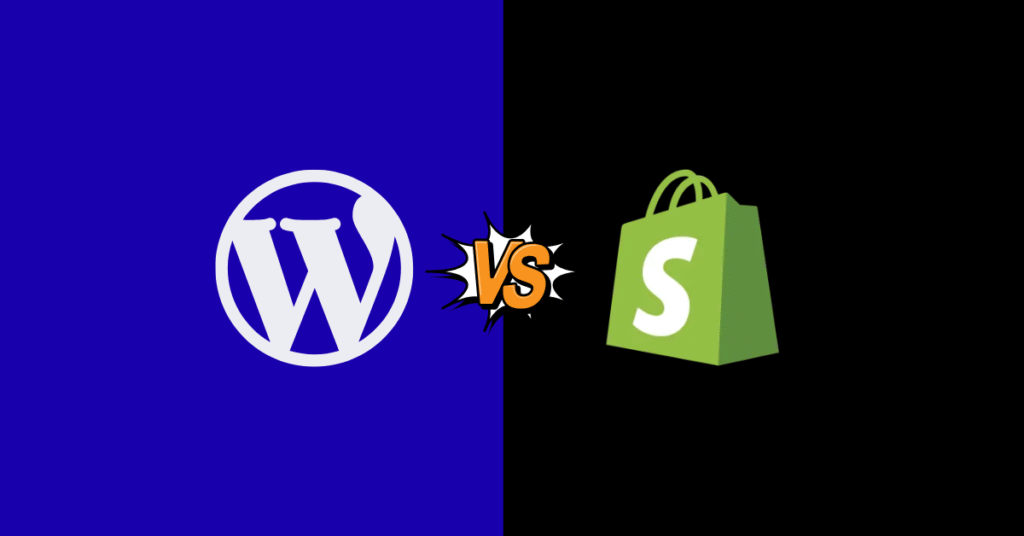I’ve had countless conversations with clients who ask the same thing: “Which one should I build my website on, between WordPress vs Shopify?”
Being honest, this is a great question.
But I cannot answer this question for you. Because the best choice will be different for each of you based on your needs.
Your choice impacts many things, like how much control you have, your website’s SEO, your customers and visitors’ retention rate, and so on.
That’s why I put this guide together. Here, I want to give you a clear breakdown of WordPress vs Shopify web design from my experience of working in this industry for around 10 years.
By the end, you’ll have a clear answer to the classic debate: Shopify vs WordPress, which is better for your business in 2025?
A Short Overview of WordPress and Shopify
Before we dive into the specific pros, cons, and costs, it’s important to set the stage. A common thought among clients I see is that they want to know how WordPress differs from Shopify.
Because they both build websites, right? Yes, you are right. However, WordPress and Shopify are different from each other in various ways.
Shopify
On the other hand, Shopify is a hosted ecommerce platform, meaning everything, hosting, security, updates, is handled for you.
As a hosted platform, they take care of all the technical sides. The entire system is built for e-commerce, so adding products, managing inventory, and processing payments is incredibly intuitive.
You can design your site intuitively using their drag-and-drop editor and free templates. However, there are some creative boundaries. While you can customize themes, you’re still working within Shopify’s framework.
Simply put, if you don’t wanna worry about the “tech stuff” and start selling, Shopify is often the faster route. But, as I’ll explain later, you trade some flexibility for that convenience
WordPress (with WooCommerce)
I like to think of WordPress as the “blank canvas” of the web design world. It’s an open-source CMS (content management system). That means you are the owner of it, you customize it, and you have the utmost control of how it grows.
- Fully customizable (both front and back-end)– I love WordPress because of its flexibility. There are no limits on the customization you can do using WordPress.
- WooCommerce integration – WooCommerce is a plugin you can install on your WordPress CMS to convert your website into a full-fledged online store.
- Needs hosting, plugins, and maintenance – WordPress has its perks. However, it also needs to be maintained. You will need hosting and a domain name for your website as well. So this is not pretty straightforward. But it does pay off because of all the benefits.
From my perspective, WordPress is perfect if you’re aiming for design freedom, scalability, and long-term SEO growth.
WordPress vs Shopify: Web Design Flexibility & Customization
Here’s where things start to get interesting. As we have been working in this industry for a long time, we have come to know that most clients don’t just want a generic website; they want a site that looks and feels like theirs.
That’s why flexibility matters so much. The difference between WordPress and Shopify really shows when you dig into how much creative freedom you actually get.
I’ll break it down side by side:
| Feature | WordPress | Shopify |
| Design Flexibility | You will get full design control via themes, page builders, and custom code | Shopify is template-based and offers limited layout freedom |
| Page Builders | There are numerous 3rd-party page builders in WordPress, like Elementor, WPBakery, and Gutenberg etc. (drag-and-drop with deep customization) | Shopify sections, limited third-party builders |
| Custom Code | Both front-end and Back-end customization are possible. Full access (HTML, CSS, JS, PHP) – nothing’s off-limits | Limited access (mostly front-end tweaks, no full back-end) |
| Templates/Themes | You will get access to thousands of free + premium themes, easily modified | Dozens of Shopify themes, polished but less flexible |
Honestly, if unique branding and scaling on your own terms are the top priorities, our team will always recommend WordPress. It gives you the raw materials to build anything, free from the confines of a template.
Now, Shopify?
It’s fantastic for getting a store online fast. First, you need to select a template. If you want, you can customize it by using the drag-and-drop editor feature. And you are done.
Which one is Costly between WordPress and Shopify
Now, let’s talk about the budget. Your budget plays a big role in deciding between WordPress and Shopify.
From my experience, I’ve seen clients underestimate the ongoing costs of web design, focusing only on setup fees. But trust me, the long-term numbers tell a different story.
Here’s a breakdown of what you can expect:
| Cost Element | WordPress | Shopify |
| Setup Cost | From $500–$5,000+ (depends on customization) | From $500–$3,000+ (theme & setup) |
| Hosting | $5–$30/month (your choice of provider) | Included |
| Themes | Free to $100+ | Free to $100–$300 |
| Plugins / Apps | Often free or a one-time purchase | Free to Monthly recurring apps ($10–$50 each) |
| Ongoing Maintenance | Required (updates, backups, security) | Mostly handled by Shopify |
If you’re a DIYer or techie, then WordPress is a fantastically affordable option. But if you’re not, you need to budget for the ongoing maintenance. Because you will need to hire someone to handle updates/backup, and security.
Shopify’s pricing model is a bit different. Usually, they have a monthly fee and app subscriptions. This might feel more expensive upfront, but that’s the price of convenience. Your hosting, security, and updates are all bundled into that cost.
So in summary? If you want complete control and have some knowledge about WordPress customization and maintenance, then WordPress usually offers more value long-term.
On the other side, if you are not a techie and want a ‘plug-&-play’ experience, Shopify’s recurring costs might actually be worth it.
SEO Capabilities: Shopify or WordPress?
If you want to sell more, you will need to have the best SEO on your websites. From my time working with both platforms, I’ve noticed WordPress and Shopify approach SEO in very different ways.
How different? For example, WordPress gives you more flexibility in SEO. On the flip side, Shopify keeps things simple. But in my opinion, Shopify could offer a better SEO system.
Here’s a head-to-head look:
| SEO Feature | WordPress | Shopify |
| On-Page SEO | It is highly customizable. You can edit any tag, URL, meta, etc. | Limited control over some elements (e.g., URL structure) |
| Plugins | Rank Math, Yoast, All in One SEO, and many other options | Built-in SEO tools + limited third-party apps |
| Site Speed | Depends on hosting, theme, and setup | Generally optimized out of the box |
| Blog Capabilities | Full-featured blogging engine (WordPress was made for content) | Basic blogging, not as flexible |
| Schema Markup | Full access via plugins or manual code | Limited unless using paid apps |
So if SEO is your top priority, then go with WordPress. You can control every little detail, install powerful plugins, and really optimize for long-term growth.
But that doesn’t mean Shopify is not offering anything related to SEO. They do a decent job for e-commerce stores that just want “good enough” SEO out of the box.
But if you’re trying to win big in organic search, say, with content marketing or aggressive keyword strategies, you’ll probably feel restricted.
Best Use Cases: When to Choose WordPress or Shopify
This is usually the part where clients lean in and ask me: “Okay, but which one should I actually use?” And my honest answer is always the same. The answer is that ‘it depends on your needs.’
The best option for you might not be the best for others. It hinges entirely on what you want your website to do for your business and how you want to manage it day-to-day.
Choose WordPress if:
So, when does WordPress make the most sense? It’s the uncontested choice when you want absolute creative and functional control. WordPress is a top choice when you want to dictate every single element of your site’s design and behavior.
WordPress has various tools and plugins for improving your website’s SEO. Finally, choose WordPress if you have ambitions that go beyond a simple store.
For instance, if you ever think you might want to add an online course platform (LMS), a community forum, or a paid membership area, WordPress can accommodate that growth seamlessly, without requiring a platform migration down the line.
Go with Shopify if:
If you need to validate a product idea or launch a store immediately, Shopify’s theme-based setup is unbeatable. You can be selling in just a day.
It is also a great option if you’re dropshipping or selling physical products. It excels at core online retail: physical goods, dropshipping, and digital products.
If you are looking for an all-in-one and low-maintenance solution, then Shopify could be a great option. When using Shopify, you won’t need to manage separate hosting or worry about applying security patches.
It’s all taken care of for a predictable monthly fee. Just be aware that this convenience can come with less flexibility for highly custom designs.
For clients who want to start selling quickly without worrying about tech, Shopify is my go-to recommendation. It’s essentially a “set it and forget it” platform, though it can be a little pricier in the long run.
WordPress or Shopify for Dropshipping?
Dropshipping is one of the most common reasons people come to me asking about WordPress vs Shopify web design.
But here’s the caveat: the platform you choose will make or break your experience.
WordPress (WooCommerce + Plugins)
If you want to dropship with WordPress, then you will need to use ‘WooCommerce’. We are actually very proficient with WooCommerce and WordPress.
Anyways, with WooCommerce, you can use plugins like AliDropship, adding the specific dropshipping functionality. This approach is cost-effective. But you need to have some technical knowledge about this.
The Pros: You get all the control over your store’s design and customer journey. You also avoid endless monthly fees, as many crucial plugins are a single payment.
A Caveat: As we were saying, you will need to handle all the steps on your own. However, if you are not a pro at WordPress, you can hire a 3rd party team. The initial setup is a project.
You will also need to have your hosting and domain set up and paid for. It’s not the easiest process at first, but the payoff is long-term flexibility and smaller monthly costs compared to hosted platforms like Shopify.
From my experience, WordPress is a great option if you’re serious about scaling and want to avoid endless recurring app fees.
Shopify (Apps like DSers, Oberlo, Spocket)
Shopify takes a different approach. In this case, you will need to install an app. Then you have to connect it to your supplier, and you’re basically ready to go.
- Plug-and-play simplicity: Apps like DSers and Spocket make importing and fulfilling orders ridiculously easy.
- Recurring fees: These apps mentioned above are not free. You will need to pay monthly for the subscription.
- Less flexibility: You can customize your website. But you do have a few limitations, as you will be working on the Shopify framework.
Our Final Suggestion
If you want to try dropshipping very fast, you can go with Shopify. But if you’re planning for the long haul and want maximum control over costs and features, WordPress with WooCommerce is the smarter bet.
Comparison Summary Table
Before we wrap this post up, let’s share a summary table comparing these two options for our readers. Here’s a quick look:
| Feature | WordPress | Shopify |
| Design Freedom | Unlimited control | Template-based |
| E-commerce Setup | More setup required | Plug-and-play simplicity |
| SEO Flexibility | Highly customizable | Limited in some areas |
| Hosting Included | No (you choose) | Yes (built-in) |
| Maintenance | Manual (updates, care) | Automatic (Shopify handles it) |
| Best For | Content + Store | E-commerce-first businesses |
With this table, I tried to highlight the tradeoff: WordPress gives you control, Shopify gives you convenience. Which one wins for you depends entirely on your goals, budget, and how hands-on you want to be.
Final Thoughts: Let Design & Strategy Drive the Platform Choice
So, which is the better option between WordPress vs Shopify?
To be honest, there is no definitive answer to this question. From my experience, the best platform is the one that aligns with your business goals and how hands-on you want to be.
You need to take this decision very seriously. Because migrating from one platform to the other later is a complex, expensive project that can stall your business momentum. So after reading all the above-mentioned information, I hope you have been able to make the right decision for you.
From our team’s perspective, the smartest move is to approach this decision strategically. You should consider your long-term vision, your budget, the complexity of your store or site, and your resources.
In short, WordPress for ultimate control. Shopify for speed and simplicity.
Still, if you’re unsure, it would be better to book a consultation with an expert before committing; avoiding costly mistakes can save you far more than any setup fee.
FAQs on WordPress vs Shopify Web Design
What’s cheaper: WordPress or Shopify?
There’s no clear answer to it. WordPress can be cheaper upfront if you handle hosting and plugins yourself. However, ongoing maintenance or hiring developers can add up.
Shopify feels pricier month-to-month because of recurring app fees. But in this case, you will not have to hire a 3rd-party for the maintenance as it bundles hosting, security, and updates. Bottom line: WordPress offers long-term savings if you manage it smartly; Shopify buys convenience.
Can I switch from Shopify to WordPress later?
Yes, but it’s not exactly a “plug-and-play” move. You will have to hire developers for this. So it will add costs. Plus, you probably won’t be able to replicate everything from your old website perfectly on the new one.
Which is better: Shopify or WordPress for web design?
It depends on what you need. I would say Shopify is great if you want a fast, low-maintenance e-commerce site. WordPress is better if you want full design control, advanced SEO, and the flexibility to scale beyond just selling products.
What’s better for content-heavy websites?
WordPress wins hands down here. Its blogging engine, SEO plugins, and customization options make it perfect for content-driven sites.
Shopify has blogging capabilities, but they’re limited, great for small stores, but not ideal if your content strategy is central to your growth.
Is WordPress more SEO-friendly than Shopify?
Generally, yes. WordPress gives you full control over meta tags, URLs, schema markup, etc. Plus, plugins like Yoast or Rank Math can help you optimize everything so fast and easily.
Shopify does okay out of the box. Then again, you’re restricted by what the platform allows and often rely on paid apps for advanced SEO. From our team’s perspective, WordPress is the safer choice if organic traffic is a priority.


